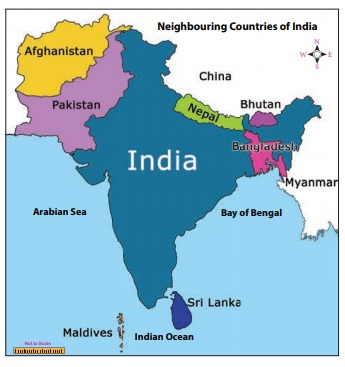Is India Really ‘Neighbourhood First’?
Relevance: GS 2 – Bilateral, regional and global groupings and agreements involving India and/or affecting India’s interests
Why in the News?
- Recent tensions highlight that several neighbouring countries have expressed dissatisfaction with India’s actions and policies.
- Raises the question – is it time for India to introspect whether its actions or policies have contributed to strained relationships?
- Examines what constitutes India’s “national interest” in its immediate neighbourhood.
Approach to Regional Influence:
- Should India aim to dominate and assert control over its neighbours?
- Is such an approach desirable or sustainable in the long term?
Effectiveness of Current Strategy:
- Could flexing muscles and browbeating neighbours backfire?
- Might it leave India in a position where it is neither respected nor trusted by neighbouring nations?
India’s Current Challenges in the Neighbourhood
Lack of Public Scrutiny in Foreign Policy
- Foreign policy decisions are traditionally left to experts and diplomats, often without public debate.
- Limited public engagement may lead to foreign policy outcomes that do not align with public interests.
- Diplomacy, especially in neighbourhood policy, requires common-sense approaches similar to handling relationships in communities.
Strained Relations with Neighbours
- Nepal: K P Oli, known for his anti-India rhetoric, has returned as Prime Minister. Broke the tradition of Nepalese PMs visiting India first, opting for China instead.
- Bangladesh: Anti-India sentiment has grown, tied to the political changes that brought Mohammed Yunus to power. New government demands Sheikh Hasina’s extradition, creating diplomatic challenges for India.
- Maldives: Mohamed Muizzu campaigned on removing Indian forces, highlighting growing anti-India sentiment.
- Sri Lanka: President Anura Dissanayake’s coalition, historically critical of Indian intervention, has gained power.
- Bhutan: While there is no regime change, the King has shown subtle shifts towards China.
- China’s Growing Influence Neighbouring countries like Maldives, Nepal, and Bhutan are leveraging China as a counterbalance to India.
- India’s traditional strategy of muscle-flexing is proving ineffective in dealing with this regional shift.
- Broader Challenges: Beyond China and Pakistan, which are expected adversaries, India faces an increasingly hostile environment with other neighbours.
- The current dynamics demand a recalibrated approach to neighbourhood diplomacy, moving away from dominance towards collaboration.
Roots of India’s Regional Diplomacy
- Not Solely Modi Government’s Doing: Many unfriendly regimes in the neighbourhood have come to power coincidentally during Modi’s tenure.
- Policies contributing to the current state of affairs were initiated well before the Modi government.
- Playing the anti-India card has been a long-standing political strategy for many South Asian leaders.
- Need for Self-Reflection: Persistent discontent among neighbours demands introspection:
- Have India’s policies contributed to the hostility?
- Should India, as the regional power, take the lead in mending ties?
- Proactive reconciliation is not a sign of weakness but a pragmatic approach to regional stability.
Case Study: Nepal
- Historical Bonds: Cultural and historical ties make a feud with Nepal seem unnecessary.
- “Big Brother” Allegations: Widespread across Nepal’s political spectrum, these complaints point to India’s perceived interference.
- Past Missteps: India’s inconsistent stance during Nepal’s democratic transition, including supporting Maoist rebels after initially branding them terrorists. Sending an ex-prince as an emissary during Nepal’s move to abolish its monarchy.
- Modi Era Issues: Nepalis believe the Modi government imposed harsh conditions during the drafting of Nepal’s new constitution. The 2015 “blockade” is viewed as Indian coercion, despite official denials, leaving a lasting scar on Nepal’s psyche.
- Onus on India
- As the larger power, India must take responsibility for rebuilding trust and addressing grievances, even if the fault isn’t entirely its own.
- Healing relationships with neighbours like Nepal is essential for long-term regional harmony.
The Perception of Indian Intervention in Nepal
- Indian Influence in Nepal’s Domestic Politics: The Indian embassy is perceived as heavily involved in Nepal’s political landscape, with:
- Preferred Allies: Relationships with specific parties like the Nepali Congress and their ties to the BJP.
- Promotion of Business Interests: Advocacy for select Indian businessmen operating in Nepal.
- RSS Influence: Allegations of RSS support for its Nepali counterpart, the Hindu Swayamsevak Sangh.
- Impact on Marginalised Communities
- Indian involvement has amplified the voices of Madhesi communities, historically sidelined by Nepal’s hill elites.
- However, the broader goals and benefits of this intervention remain unclear.
- Shift in Diplomacy Dynamics Evolution of Nepali leaders’ interactions with Indian counterparts:
- Direct engagement with Indian leaders transitioned to dealings with diplomats and civil society leaders.
- Presently, many Nepali leaders find themselves interacting with intelligence operatives and intermediaries.
- This has led to:
- Increased conspiracy theories about Indian agencies like RAW.
- A perception of ineffective and morally dubious interventions, achieving neither trust nor tangible outcomes.
Rethinking India’s Neighbourhood Policy
- From “Neighbourhood First” to “Neighbourliness First”
- Current policy under the Modi government is unclear: Is the priority on neighbours’ concerns or asserting India’s dominance in the region?
- A shift to a “neighbourliness first” approach could emphasize:
- Respect for sovereignty.
- Non-interference in internal affairs.
- Prohibiting hostile activities from one’s territory.
- Peaceful dispute resolution.
- The Gujral Doctrine as a Model Former PM I. K. Gujral proposed a principle for smaller neighbours like Nepal, Bangladesh, Bhutan, Sri Lanka, and Maldives:
- India should not seek reciprocity but accommodate their needs in good faith and trust.
- Adopting a Collaborative Approach
- Critics view such policies as overly idealistic or naive.
- However, it raises critical questions:
- Have India’s current tactics truly advanced its national interest?
- What defines “national interest,” and whose interests does it ultimately serve?
Associated article
https://universalinstitutions.com/three-neighbourhood-questions/
Mains question
Examine India’s evolving neighbourhood policy with a focus on recent challenges and the need to foster regional trust, stability, and cooperation. (250 words)




